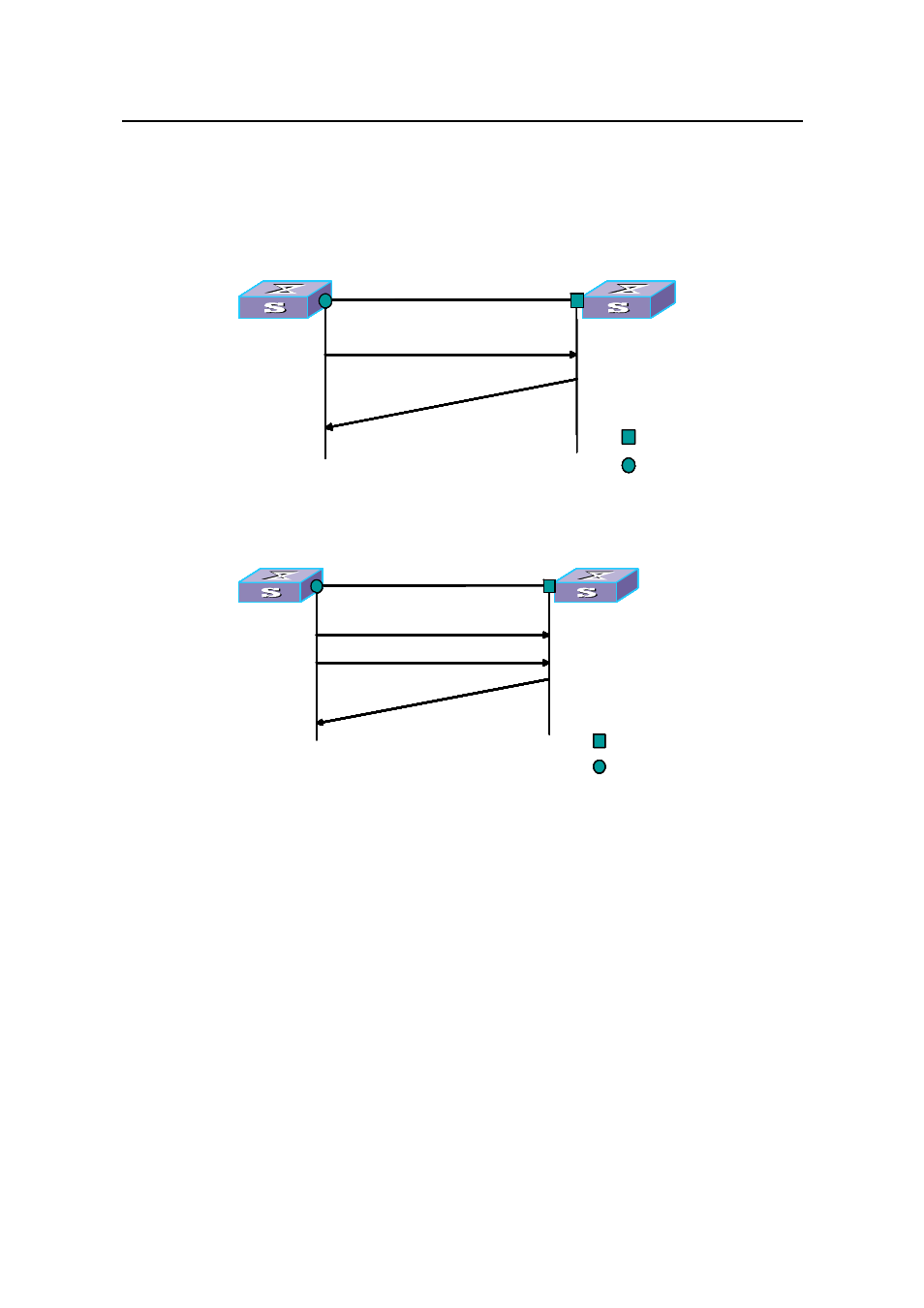H3C Technologies H3C S3100 Series Switches User Manual
Page 216

Operation Manual – MSTP
H3C S3100-52P Ethernet Switch
Chapter 1 MSTP Configuration
1-41
z
For RSTP, the upstream switch does not send agreement packets to the
downstream switch.
Figure 1-3 and Figure 1-4 illustrate the rapid transition mechanisms on designated
ports in RSTP and MSTP.
Designated port
Root port
Upstream sw itch
Dow nstream switch
Sends proposal packets to
request rapid transition
Sends agreement packets
Root port blocks other
non-
changes to Forwarding
state, and sends
agreement packets
to the upstream switch
Designated port
changes to
Forw arding state
-edge ports
Designated port
Root port
Upstream sw itch
Dow nstream switch
Sends proposal packets to
request rapid transition
Sends agreement packets
Root port blocks other
non-
changes to Forwarding
state, and sends
agreement packets
to the upstream switch
Designated port
changes to
Forw arding state
-edge ports,
Designated port
Root port
Upstream sw itch
Dow nstream switch
Sends proposal packets to
request rapid transition
Sends agreement packets
Root port blocks other
non-
changes to Forwarding
state, and sends
agreement packets
to the upstream switch
Designated port
changes to
Forw arding state
-edge ports
Designated port
Root port
Upstream sw itch
Dow nstream switch
Sends proposal packets to
request rapid transition
Sends agreement packets
Root port blocks other
non-
changes to Forwarding
state, and sends
agreement packets
to the upstream switch
Designated port
changes to
Forw arding state
-edge ports,
Figure 1-3
The RSTP rapid transition mechanism
Designated port
Root port
Upstream switch
Downstream switch
Send proposal packets
to request rapid transition
Send agreement packets
Root port changes to
Forwarding state and
sends agreement packets
to upstream switch
Designated port
Forwarding state
Send agreement packets
Root port blocks
other non-edge ports
-
Designated port
Root port
Upstream switch
Downstream switch
Send proposal packets
to request rapid transition
Send agreement packets
Root port changes to
Forwarding state and
sends agreement packets
to upstream switch
Designated port
changes to
Forwarding state
Send agreement packets
Root port blocks
other non-edge ports
-
Designated port
Root port
Upstream switch
Downstream switch
Send proposal packets
to request rapid transition
Send agreement packets
Root port changes to
Forwarding state and
sends agreement packets
to upstream switch
Designated port
Forwarding state
Send agreement packets
Root port blocks
other non-edge ports
-
Designated port
Root port
Upstream switch
Downstream switch
Send proposal packets
to request rapid transition
Send agreement packets
Root port changes to
Forwarding state and
sends agreement packets
to upstream switch
Designated port
changes to
Forwarding state
Send agreement packets
Root port blocks
other non-edge ports
-
Figure 1-4
The MSTP rapid transition mechanism
The cooperation between MSTP and RSTP is limited in the process of rapid transition.
For example, when the upstream switch adopts RSTP, the downstream switch adopts
MSTP and the downstream switch does not support RSTP-compatible mode, the root
port on the downstream switch receives no agreement packet from the upstream switch
and thus sends no agreement packets to the upstream switch. As a result, the
designated port of the upstream switch fails to transit rapidly and can only turn to the
forwarding state after a period twice the forward delay.
Some other manufacturers' switches adopt proprietary spanning tree protocols that are
similar to RSTP in the way to implement rapid transition on designated ports. When a
switch of this kind operating as the upstream switch connects with a H3C series switch
running MSTP, the upstream designated port fails to change its state rapidly.
The rapid transition feature is developed to resolve this problem. When a H3C series
switch running MSTP is connected in the upstream direction to another manufacturer's
